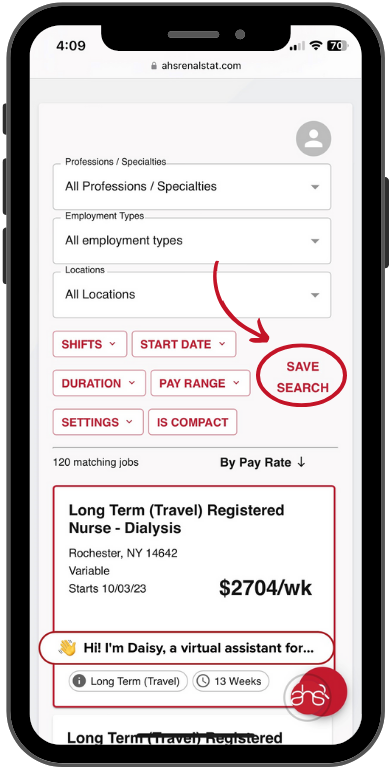Becoming a dialysis travel technician lets you use your skills to help patients with kidney disease while exploring new cities and earning great pay. But landing the best travel dialysis tech jobs takes more than just technical know-how. You need strong “soft skills” – those personal qualities that help you connect with patients and colleagues.
In this post, we’ll break down the essential soft skills every dialysis travel tech needs to succeed. At AHS RenalStat, we’ll help you get started and give you the tools you need to succeed. We are your source for dialysis tech jobs across the country. Check out our current job openings now.
What are Soft Skills?
Soft skills are the people skills that help you thrive in any job. They’re those personal qualities that make you a great communicator, a flexible teammate, and someone who can handle challenges with a cool head.
Soft skills are different from the technical skills you learn in school. You might be a whiz at operating dialysis machines, but can you explain a complex medical procedure to a worried patient in a way they understand? Can you adapt to a new hospital’s way of doing things?
In dialysis, you’re working with people facing serious health challenges. They need more than just medical expertise; they need compassion, understanding, and clear communication. And as a travel tech, you’ll be working in different environments with diverse teams, making soft skills even more crucial. These skills help you build trust with patients, collaborate effectively with colleagues, and navigate the ever-changing landscape of healthcare.
Essential Soft Skills for Jobs as a Dialysis Tech
Let’s dive into the specific soft skills that will make you stand out and succeed in travel dialysis tech jobs.
Communication

Communication is key in any healthcare setting, but it’s especially vital in dialysis. You’ll be interacting with a diverse range of people – patients with varying levels of health literacy, anxious family members, busy doctors, and fellow nurses. Clear and empathetic communication is essential for providing top-notch care.
- Verbal Communication: Think of this as your bedside manner. Can you explain dialysis procedures in a way that’s easy to understand? Do you actively listen to patient concerns and answer their questions with patience and compassion? Can you communicate effectively with the medical team, providing concise updates and asking clarifying questions? Remember, effective verbal communication involves not just speaking clearly, but also actively listening and observing non-verbal cues.
- Written Communication: Accurate documentation is crucial in healthcare. As a dialysis tech, you’ll be responsible for maintaining detailed patient records, recording vital signs, and reporting any changes in a patient’s condition. Your written communication needs to be clear, concise, and professional, whether it’s a patient chart or an email to a colleague.
Adaptability
In travel dialysis tech jobs, you’ll be hopping between different hospitals and clinics, each with its own unique environment, procedures, and team dynamics. Being adaptable is key to thriving in this ever-changing landscape.
- Embrace New Environments: Every hospital has its own culture and way of doing things. Be ready to learn new protocols, adapt to different equipment, and navigate unfamiliar surroundings.
- Flexibility is Key: Travel assignments often come with varied schedules and last-minute changes. Be prepared to work different shifts, cover for colleagues, and adjust your routine as needed.
- Embrace the Learning Curve: You might encounter different dialysis machines or software systems than you’re used to. Be open to learning new technologies and procedures, and don’t be afraid to ask for help when needed.
Teamwork
Dialysis requires a team effort. You’ll be working closely with nurses, doctors, social workers, and other healthcare professionals to provide comprehensive patient care. Strong teamwork skills are essential for smooth collaboration and a positive work environment.
- Collaboration is Key: Be a team player! Contribute your skills and knowledge, actively participate in team discussions, and be willing to lend a helping hand to colleagues.
- Build Relationships: Make an effort to connect with your new team members in each location. A friendly attitude and a willingness to collaborate go a long way in building rapport.
- Respect Different Roles: Understand and appreciate the contributions of each team member, from the nurses to the cleaning staff. A cohesive team works together effectively and supports each other.
Problem-Solving
In dialysis, unexpected situations can arise. A patient might experience a sudden drop in blood pressure, a machine could malfunction, or a scheduling conflict might occur. Being a skilled problem-solver helps you navigate these challenges effectively.
- Critical Thinking: Dialysis requires you to think on your feet. You need to be able to assess situations quickly, identify potential problems, and come up with solutions.
- Stay Calm Under Pressure: When things go wrong, it’s crucial to remain calm and focused. Panicking won’t help anyone. Take a deep breath, assess the situation, and take appropriate action.
- Resourcefulness: Know where to find information and who to ask for help when you encounter a problem you can’t solve on your own.
Emotional Intelligence
Dialysis patients often face significant emotional and physical challenges. They may be dealing with fear, anxiety, and uncertainty about their health. When you work in dialysis tech jobs, you need high emotional intelligence to provide compassionate care and build trust with your patients.
- Empathy: Put yourself in your patients’ shoes. Try to understand their emotions and concerns, and offer support and encouragement.
- Self-Awareness: Be mindful of your own emotions and how they might affect your interactions with patients.
- Build Trust: Create a safe and supportive space for patients to share their feelings. Be a good listener, offer reassurance, and maintain confidentiality.
- Compassion in Action: Small gestures of kindness can go a long way. A warm smile, a gentle touch, or a few words of encouragement can make a big difference in a patient’s day.
Developing and Growing Your Skills for Dialysis Tech Jobs
So how can you develop these skills and showcase them to potential employers? First, take some time to honestly assess your strengths and weaknesses. Are you a naturally good listener? Do you struggle with adapting to new situations? Identifying your areas for improvement is the first step to growth. There are tons of resources available to help you hone your soft skills. Consider taking courses or workshops on communication, emotional intelligence, conflict resolution, or teamwork.
Like any new skill, these areas of growth will require practice. Look for opportunities to actively develop them. Ask for feedback on your communication style after interactions. Consciously practice empathy and active listening in your daily life. By actively practicing these skills in your everyday life, you’ll be well-prepared to handle the interpersonal demands of a dialysis travel tech job with confidence and grace.
We Help You Find Top Dialysis Tech Travel Jobs
AHS RenalStat is your partner in finding the perfect travel dialysis tech jobs. We connect you with top healthcare facilities offering competitive pay, exciting locations, and rewarding experiences. Our dedicated team provides personalized support and guidance every step of the way. Talk to one of our recruiters now.

